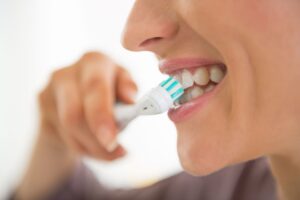
You probably already know that brushing your teeth twice daily at home is an essential component of preventative dental care. However, are you aware that it’s possible to damage your smile by brushing too hard? It may seem counterintuitive because generally consistently cleaning your pearly whites is a positive trait, but in some cases, there can be too much of a good thing. Keep reading to learn more about the potential risks and how to know if you should brush more gently!
How Does Brushing Too Hard Harm My Teeth?
It’s important to regularly remove bacteria and plaque buildup from your teeth and gums to prevent dental problems, but you don’t need a ton of force to do so effectively. If you overbrush your smile, you could develop “toothbrush abrasion” that results in tooth sensitivity and even receding gums.
This happens because applying too much force can wear down your enamel as well as put added pressure on your gums, pushing them back. This can expose the vulnerable roots that are usually covered which leaves you more susceptible to tooth decay and gum disease.
What Are Common Signs of Overbrushing?
If you’re not sure whether your dental hygiene habits are causing harm, there are a few indicators to look for. Paying attention to the condition of your grin can reveal whether you’re hurting your smile. You might have a problem if you notice:
- Receding gums. If your gumline seems to be withdrawing away from your teeth then this could be the culprit.
- Tooth sensitivity. When parts of your pearly whites that are usually covered become exposed, you might experience discomfort especially when eating or drinking anything too hot or cold.
- Darker shades. Your teeth are colored differently below your gumline because they don’t have the bright white layer of enamel to protect them. If you have this issue then they may start to look darker where they meet your gums.
How Can I Avoid Overbrushing?
Fortunately, making a few simple adjustments can mitigate the impact of overbrushing your teeth. Some helpful tips include:
- Using three fingers only. Holding your toothbrush with fewer fingers can reduce the pressure during your daily hygiene routine.
- Get a softer toothbrush. Most stores carry a variety of toothbrushes so it’s not difficult to find one with softer bristles to avoid abrasive injuries.
- Try a 45-degree angle. You can effectively cleanse along your gumline by holding your toothbrush at a 45-degree angle, which might encourage you to be less aggressive.
Now that you know more about how to effectively brush your teeth, you can keep them clean without using so much force that you damage them!
About the Author
Dr. S. John Salivonchik has more than 20 years of experience helping people improve their lives by enhancing their oral health. He achieved his undergraduate degree from Muhlenberg College and then earned his Doctor of Dental Medicine from the Temple Dental School where he graduated Summa Cum Laude. Now, he stays current with the latest advancements in dental technology and techniques by participating in ongoing training and seminars throughout the country. He combines a compassionate approach with state-of-the-art equipment to keep you comfortable while providing accurate results. If you’re concerned you’re overbrushing and would like a checkup, you’re welcome to request an appointment on the website or by calling (610) 502-1545.
 Request An Appointment
Request An Appointment